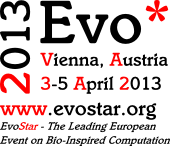Computational Intelligence for Risk Management, Security and Defence Applications
Recent events involving both natural disasters and human-made attacks have emphasised the importance of solving challenging problems in risk management, security and defence. Traditional methods have proven insufficient to address these problems and hence Computational Intelligence techniques present themselves as a more appealing alternative.
Areas of Interest and Contributions
We seek both theoretical developments and applications of Computational
Intelligence to these subjects. All bio-inspired computational paradigms
are welcome, mainly Genetic and Evolutionary Computation, but also Fuzzy
Logic, Intelligent Agent Systems, Neural Networks, Cellular Automata, Artificial
Immune Systems and others, including hybrids.
Topics include but are not limited to:
- Cyber crime: anomaly detection systems, attack prevention and defence, threat forecasting systems, anti spam, antivirus systems, cyber warfare, cyber fraud
- IT Security: Intrusion detection, behaviour monitoring, network traffic analysis …
- Resilient and self-healing systems
- Risk management: identification, prevention, monitoring and handling of risks, risk impact and probability estimation systems, contingency plans, real time risk management
- Critical Infrastructure Protection (CIP)
- Military, counter-terrorism and other defence related aspects
- Disaster relief and humanitarian logistics
- Real-world applications of these subjects
Publication Details
Accepted papers will appear in the proceedings of EvoStar, published in a volume of the Springer Lecture Notes in Computer Science, which will be available at the Conference.
Submission Details
Submissions must be original and not published elsewhere. They will be peer reviewed by members of the program committee. The reviewing process will be double-blind, so please omit information about the authors in the submitted paper.
Submit your manuscript in Springer LNCS format.
Page limit: 10 pages to http://myreview.csregistry.org/evoapps13/.
Submission deadline: 1 November 2012 Extended to 11 November 2012
EvoRISK track chairs
- Anna I Esparcia-Alcázar
S2 Grupo, Spain
aesparcia(at)s2grupo.es - Sara Silva
INESC-ID Lisbon, Portugal
sara(at)kdbio.inesc-id.pt
Programme Committee
- Hussein Abbass, UNSW@Australian Defence Force Academy, Australia
- Robert K. Abercrombie, Oak Ridge National Laboratory, USA
- Rami Abielmona, University of Ottawa, Canada
- Anas Abou El Kalam, École Nationale Supérieure d'Ingénieurs de Bourges, France
- Nabendu Chaki, University of Calcutta, India
- Mario Cococcioni, NATO Undersea Research Centre, Italy
- Josep Domingo-Ferrer, Rovira i Virgili University, Spain
- Solange Ghernaouti-Hélie, University of Lausanne, Switzerland
- Malcom Heywood, Dalhousie University, Canada
- Miguel Juan, S2 Grupo, Spain
- David Megías, Universitat Oberta de Catalunya, Spain
- Javier Montero, Universidad Complutense de Madrid, Spain
- Frank W. Moore, University of Alaska Anchorage, USA
- Kay Chen Tan, National Univerisity of Singapore
- Vicenç Torra, CSIC, Spain
- Antonio Villalón, S2 Grupo, Spain
- Xin Yao, University of Birmingham, UK
- Nur Zincir-Heywood, Dalhousie University, Canada






